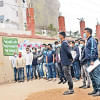3.77cr suffered food insecurity last year

Around 3.77 crore people experienced moderate to severe food insecurity in 2023, according to a survey by Bangladesh Bureau of Statistics.
Of them, 14.77 lakh or 0.87 percent people experienced severe food insecurity, finds the report titled "Food Security Statistics 2023"
This implies a high probability of reduced food intake, and it can lead to severe forms of undernutrition, it observes.
The survey was conducted among 29,760 households across the country in June last year.
The respondents were asked whether they had skipped at least one meal anytime in the previous 12 months because they could not afford it. Over 4.30 percent said they had.
Over 1.50 percent of the people said they went hungry for an entire day while three percent said they suffered hunger once or twice every month.
The survey measured food security based on answers to different questions from the participants.
The respondents were asked if they went without food for a whole day, ran out of food, ate less than they should have, ate healthy and nutritious food, and were worried about not having enough to eat.
Almost 70 percent of the poorest households suffered moderate or severe food insecurity.
"This is definitely something to worry about," says Prof Mustafizur Rahman, a distinguished fellow at the Centre for Policy Dialogue.
A large number of people who are not considered poor are in a vulnerable condition, according to him.
Elevated levels of inflation in the last two years have badly impacted the people's food intake, he adds.
"It is unacceptable that one fifth of the population experience food insecurity at a time when Bangladesh is preparing for LDC graduation and becoming a developing country."
Food insecurity is typically associated with the inability to regularly eat healthy, balanced diets.
According to the Bangladesh Bureau of Statistics, "High prevalence of food insecurity at moderate levels can be considered a predictor of various forms of diet-related health conditions in the population with micronutrient deficiency and unbalanced diets."
As per the survey, 29.41 percent individuals in Rangpur division witnessed moderate food insecurity and 17.45 percent in Dhaka.
It adds that 1.189 percent suffered severe food insecurity in Chattogram division and 1.417 percent in Sylhet.
Rural areas saw higher food insecurity than urban areas: 24.12 percent and 20.77 percent respectively.
In rural areas, 0.91 percent of the households reported that they were severely food insecure.
Around 11.45 percent of the households in the city corporation area suffered from moderate or severe food insecurity, according to the survey.
In August last year, a World Food Programme report said 24 percent people in Bangladesh were food insecure.
Prof Mustafizur recommends that the government revisit its social safety net programmes and midday meal programmes at schools.


 For all latest news, follow The Daily Star's Google News channel.
For all latest news, follow The Daily Star's Google News channel. 









Comments